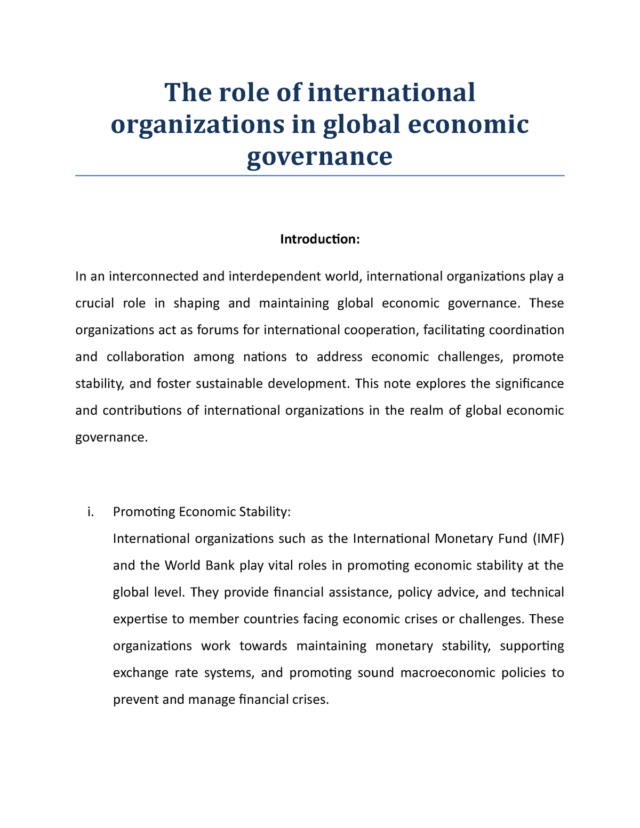In the modern world, international organizations have assumed a critical role in shaping global politics. These entities have been instrumental in fostering cooperation, resolving conflicts, and promoting development among nations. The influence exerted by organizations such as the United Nations (UN), the World Trade Organization (WTO), and the International Monetary Fund (IMF) has been profound and far-reaching. Through their efforts, a framework for international relations has been established, significantly impacting political, economic, and social dimensions worldwide.
Historical Context
The establishment of international organizations was driven by the need to address issues that transcend national boundaries. In the aftermath of World War II, the United Nations was founded to prevent future conflicts and to promote peace and security. The UN Charter, signed in 1945, laid the groundwork for a new era of international cooperation. The creation of the International Monetary Fund and the World Bank during the Bretton Woods Conference in 1944 was aimed at fostering economic stability and development. These organizations were conceived to address the economic disruptions caused by the war and to promote a stable international economic order.
Peace and Security
International organizations have played a pivotal role in maintaining global peace and security. The United Nations Security Council (UNSC) has been entrusted with the primary responsibility for maintaining international peace and security. Through various peacekeeping missions, the UN has intervened in conflict zones to stabilize regions and protect civilians. Operations in regions such as the Balkans, Africa, and the Middle East have been undertaken to prevent the escalation of conflicts and to facilitate the negotiation of peace agreements.
Conflict resolution has been facilitated by these organizations through diplomatic channels. Mediation efforts by the UN and regional organizations like the African Union (AU) have led to the resolution of disputes. The principle of collective security, embedded in the UN Charter, has enabled member states to take collective action against aggression, thereby deterring potential conflicts.
Economic Development
The role of international organizations in economic development cannot be overstated. The International Monetary Fund (IMF) and the World Bank have provided financial assistance and technical expertise to developing countries. Structural adjustment programs and economic reforms have been implemented with the support of these institutions to promote economic stability and growth. The IMF’s role in providing balance of payments support has helped countries navigate financial crises.
Trade liberalization has been promoted by the World Trade Organization (WTO), which oversees the implementation of international trade agreements. Dispute resolution mechanisms have been established to ensure compliance with trade rules, thereby fostering a predictable and stable global trading system. The reduction of trade barriers and the promotion of free trade have contributed to economic growth and development across the globe.
Human Rights and Humanitarian Assistance
The promotion of human rights has been a central focus of international organizations. The Universal Declaration of Human Rights, adopted by the UN General Assembly in 1948, established a global standard for human rights. Monitoring and reporting mechanisms have been established by the UN Human Rights Council to address violations and to hold states accountable. Special rapporteurs and committees have been appointed to investigate and report on human rights issues in various countries.
Humanitarian assistance has been coordinated by international organizations during times of crisis. The United Nations High Commissioner for Refugees (UNHCR) has provided protection and assistance to millions of refugees and displaced persons. The World Food Programme (WFP) has delivered food aid to populations affected by conflicts and natural disasters. These efforts have alleviated suffering and have contributed to the stabilization of affected regions.
Environmental Protection
The role of international organizations in environmental protection has gained prominence in recent decades. Global environmental issues such as climate change, biodiversity loss, and pollution have been addressed through international cooperation. The United Nations Framework Convention on Climate Change (UNFCCC) has facilitated negotiations leading to the adoption of the Kyoto Protocol and the Paris Agreement, which set targets for reducing greenhouse gas emissions.
The Intergovernmental Panel on Climate Change (IPCC) has provided scientific assessments on climate change, informing policy decisions at the national and international levels. Efforts to protect biodiversity have been coordinated through the Convention on Biological Diversity (CBD), which aims to conserve biological diversity, promote sustainable use of its components, and ensure fair and equitable sharing of benefits arising from genetic resources.
Challenges and Criticisms
Despite their significant contributions, international organizations have faced numerous challenges and criticisms. Issues related to sovereignty and the principle of non-interference in domestic affairs have often been raised by member states. The effectiveness of international organizations has been questioned in cases where political will and consensus among member states were lacking.
Bureaucratic inefficiencies and lack of transparency have also been cited as challenges. Reforms have been called for to enhance the efficiency and accountability of these organizations. The disproportionate influence of powerful member states in decision-making processes has been a point of contention, particularly in organizations like the UN Security Council, where permanent members wield significant power through their veto rights.
Conclusion
In conclusion, international organizations have played an indispensable role in global politics. Through their efforts in maintaining peace and security, promoting economic development, protecting human rights, providing humanitarian assistance, and addressing environmental issues, these organizations have significantly shaped the global political landscape. Despite facing challenges and criticisms, the importance of international cooperation and multilateralism in addressing global issues cannot be overstated. The ongoing efforts to reform and strengthen these organizations will be crucial in ensuring their continued relevance and effectiveness in the rapidly changing global environment.










